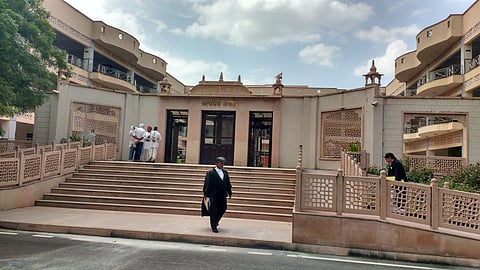
- News
- Columns
- Interviews
- Law Firms
- Apprentice Lawyer
- Legal Jobs
- हिंदी
- ಕನ್ನಡ

It was only a matter of time before the Criminal Laws (Rajasthan Amendment) Ordinance, 2017 was assailed in court, considering the uproar it caused last week.
A writ petition has been filed today at the Jaipur Bench of the Rajasthan High Court challenging the vires of the Ordinance. The case is likely to come up for hearing at 2 pm today.
Filed by one Bhagwat Gour, through advocates Ajay Kumar Jain, Aditya Jain, Sushila Nagar and Ravi Saini, the petition contends that the Ordinance is violative of Articles 14, 19 and 21 of the Constitution.
The Ordinance, passed in September this year, seeks to amend sections 156(3) and 190 of the Code of Criminal Procedure, thereby preventing Magistrates from directing investigations into present and retired judges and public servants without prior sanction of the government.
It has been contended that the Ordinance effectively nullifies Section 197 of the CrPC, which prevents courts from taking cognizance against a specific class of public servants without prior sanction. It states,
“…the main provision of Section-197 of Cr.P.C. and the protection under section 197 of Cr.P.C. has been extended to each and every public servant defined under any law that means any Panch, Sarpanch, Member or office bearer of Cooperative Society, MP., MLA, Member of Cooperation, Employees of Universities who has been defined in public servant has also been given arbitrarily protection of investigation of crime which is violative of Article-14 and 21 of the Constitution of India.”
It is also pointed out that the Supreme Court has held that sanction is only required for cognizance and not for initiation of investigation.
The petition also assails the insertion of a new Section 228-B to the Indian Penal Code, which seeks to deter the media from publishing the details of public servants against whom an investigation has been set in motion.
Section 228-A was inserted after the Supreme Court issued guidelines to prevent the disclosure of the names of rape victims by the media. And affording the same protection to public servants, the petition contends, does not have any nexus to the objective sought to be achieved.
“The object of Section-228-A was to ensure that to some extent the victim who already under goes trauma of physical and mental torture, is not put to further uncomfortable situation. However, against the constitutional provision without having any nexus with the object sought to be achieved arbitrarily and against the right to know which is part of Article-19 of the Constitution of India, Section-228-B has been introduced to save the identity of the alleged delinquents.”
The proposed Section 228-B has also been challenged as being violative of the fundamental right to know, which is a part of Article 19 of the Constitution.
Further, the petition points out that the Ordinance will effectively hamper attempts to fight corruption, and that it is the duty of the courts to prevent the same.
“Because today corruption in our country not only poses a grave danger to the concept of constitution governance, it also threatens the very foundation of Indian Democracy and the rule of law. The magnitude of corruption in our public life is incompatible with the concept of socialist secular democratic republic… Therefore, the duty of the court is that any anti corruption law has to be interpreted and worked out in such a fashion, so as to strengthen the fight against corruption.”
Therefore, it has been prayed that the High Court allows the petition and declare the Ordinance as being unconstitutional.
Read the petition: